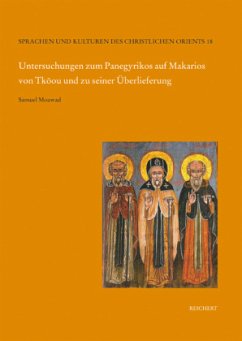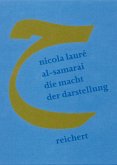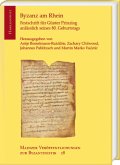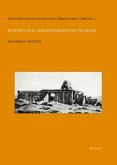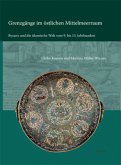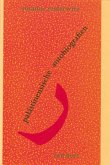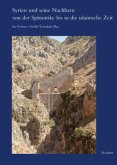The Panegyric on the Coptic bishop Macarius (_ 451) of the city of Tkoou in Upper Egypt is the only complete Coptic text that reports on the Council of Chalcedon in 451 A.D. It is a mixture out of hagiography, church history and theology. Beside a profound study of the Panegyric on Macarius in general, this book offers for the first time an edition of the Arabic version of the Panegyric with a German translation. This study also demonstrates how often this Panegyric has been used in later sources. Furthermore, the Panegyric on Macarius is used in this study as a base to shed light on the philosophy of writing history by the Copts.
Hinweis: Dieser Artikel kann nur an eine deutsche Lieferadresse ausgeliefert werden.
Hinweis: Dieser Artikel kann nur an eine deutsche Lieferadresse ausgeliefert werden.
"Grundsätzlich handelt es sich bei einem Panegyrikos nicht um eine Biographie sondern um eine Lobrede zur Verherrlichung dessen, auf auf den der Panegyrikos verfasst wurde, wo dann positive Eigenschaften und Ereignisse stärker herausgestrichen und negative Seiten soweit möglich unterdrückt werden. Von einer Biographie werden dagegen mehr Realität und historisch zuverlässige Daten (S.265) erwartet. Auf jeden Fall sind auch in dem hier vorliegenden Panegyrikos auf Makarios von Tkoou zahlreiche nützliche Informationen enthalten, die zur Aufhellung der Kirchenpolitischen Situation im Rahmen des Konzils von Chalkedon beitragen."
P. Grossmann
In: Bulletin de la société d'Archéologie copte, Tome L (2011) S. 174-177.
--------------------------------------
"Samuel Moawad has in this volume given us not only a critical edition of the Arabic text and commentary on the Panegyric of Macarios, but in his effort to push the scholarship on the text in a literary-critical direction has opened windows into the ongoing life of the text within the living Coptic tradition. Herein lays the real value of the work, alongside which I might note the wealth of secondary information that the author brings to bear on the study of the text. While the latter remains difficult to access, there is much to find here on many a topic of interest apart from the specifics that connect it to the panegyric. (...)
These observations do not alter the judgment of this book as an important piece of scholarship that significantly advances our understanding of the Panegyric of Macarios of Tkôu and its place within Coptic tradition. Furthermore, beyond the specific text in question, the volume underscores the importance of a literarycritical approach to Coptic literature, the gains realized through the inclusion of long neglected Arabic sources in the study of the tradition, and the living nature of texts within the life of the community. While the volume's content and structure suggests its origin as a dissertation, its erudition rewards the reader with numerous facts, insights, and ideas."
James E. Goehring
In: Journal of Coptic Studies 14 (2012) S. 159-178.
In: Journal of Coptic Studies. 14 (2012). pp. 165-168.
----------------------------------------------
"Hinter der Formulierung "Untersuchungen zum Panegyrikos auf Makarios von Tkoou" versteckt sich das dritte Kapitel mit dem Titel "Die arabische Version des Panegyrikos auf Makarios: Handschrift DE-GN arab. 114", das wohl für die meisten Leser das zentrale Kapitel sein dürfte (63- 53). Mit anderen Worten: Es handelt sich bei den "Untersuchungen" im eigentlichen Sinn nicht nur um Untersuchungen zu einem bereits aus der Überlieferung bekannten Text, sondern um die Edition der arabischen Version nach einer Göttinger Handschrift, die mit mehreren anderen arabischen Handschriften verglichen wird. Und mit einer derartigen Edition wird ein weiterer interessanter Text aus der Kirchengeschichte für einen breiten Leserkreis erreichbar, der mitten in die Auseinandersetzung der koptischen Tradition in ihrer antichalkedonensischen Prägung mit dem Konzil von Chalkedon
hineinführt: Der besagte Makarios, Bischof einer oberäigyptischen Stadt namens Tkoou, stirbt anlässlich seiner Weigerung, den Tomus Leonis zu unterschreiben, den Märtyrertod (...)
Es bleibt zu hoffen, dass das Werk auch außerhalb der eher begrenzten Disziplin der Koptologie vor allem von der Theologie rezipiert wird. Immerhin werden genügend Details geschildert, die für unterschiedliche Teildisziplinen der Theologie von Interesse sind, sei es die Erforschung von Mönchtum, Brauchtum oder auch die Erforschung der Frage einer religiös motivierten Anwendung von Gewalt gegenüber Vertretern anderer Traditionen."
Hans Förster
In: Theologische Literaturzeitung. 137 (2012) 10. Sp. 1077-1079.
P. Grossmann
In: Bulletin de la société d'Archéologie copte, Tome L (2011) S. 174-177.
--------------------------------------
"Samuel Moawad has in this volume given us not only a critical edition of the Arabic text and commentary on the Panegyric of Macarios, but in his effort to push the scholarship on the text in a literary-critical direction has opened windows into the ongoing life of the text within the living Coptic tradition. Herein lays the real value of the work, alongside which I might note the wealth of secondary information that the author brings to bear on the study of the text. While the latter remains difficult to access, there is much to find here on many a topic of interest apart from the specifics that connect it to the panegyric. (...)
These observations do not alter the judgment of this book as an important piece of scholarship that significantly advances our understanding of the Panegyric of Macarios of Tkôu and its place within Coptic tradition. Furthermore, beyond the specific text in question, the volume underscores the importance of a literarycritical approach to Coptic literature, the gains realized through the inclusion of long neglected Arabic sources in the study of the tradition, and the living nature of texts within the life of the community. While the volume's content and structure suggests its origin as a dissertation, its erudition rewards the reader with numerous facts, insights, and ideas."
James E. Goehring
In: Journal of Coptic Studies 14 (2012) S. 159-178.
In: Journal of Coptic Studies. 14 (2012). pp. 165-168.
----------------------------------------------
"Hinter der Formulierung "Untersuchungen zum Panegyrikos auf Makarios von Tkoou" versteckt sich das dritte Kapitel mit dem Titel "Die arabische Version des Panegyrikos auf Makarios: Handschrift DE-GN arab. 114", das wohl für die meisten Leser das zentrale Kapitel sein dürfte (63- 53). Mit anderen Worten: Es handelt sich bei den "Untersuchungen" im eigentlichen Sinn nicht nur um Untersuchungen zu einem bereits aus der Überlieferung bekannten Text, sondern um die Edition der arabischen Version nach einer Göttinger Handschrift, die mit mehreren anderen arabischen Handschriften verglichen wird. Und mit einer derartigen Edition wird ein weiterer interessanter Text aus der Kirchengeschichte für einen breiten Leserkreis erreichbar, der mitten in die Auseinandersetzung der koptischen Tradition in ihrer antichalkedonensischen Prägung mit dem Konzil von Chalkedon
hineinführt: Der besagte Makarios, Bischof einer oberäigyptischen Stadt namens Tkoou, stirbt anlässlich seiner Weigerung, den Tomus Leonis zu unterschreiben, den Märtyrertod (...)
Es bleibt zu hoffen, dass das Werk auch außerhalb der eher begrenzten Disziplin der Koptologie vor allem von der Theologie rezipiert wird. Immerhin werden genügend Details geschildert, die für unterschiedliche Teildisziplinen der Theologie von Interesse sind, sei es die Erforschung von Mönchtum, Brauchtum oder auch die Erforschung der Frage einer religiös motivierten Anwendung von Gewalt gegenüber Vertretern anderer Traditionen."
Hans Förster
In: Theologische Literaturzeitung. 137 (2012) 10. Sp. 1077-1079.

